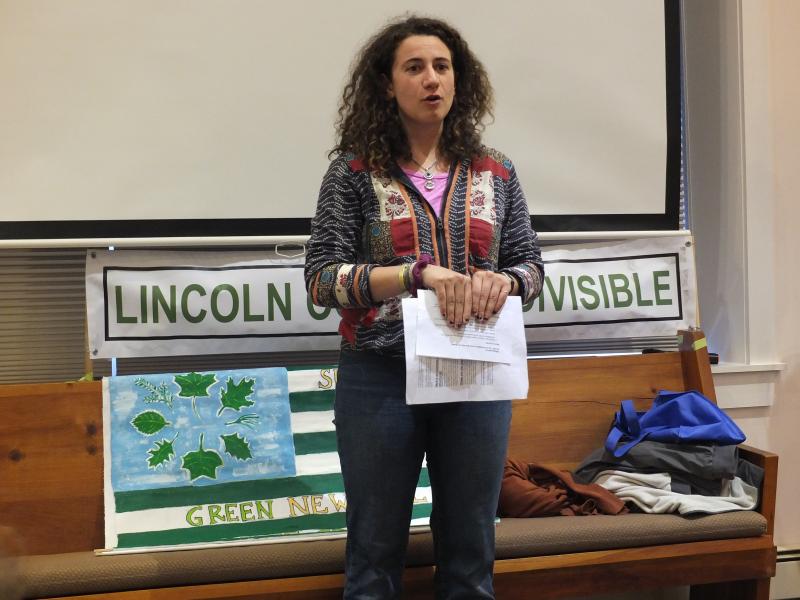State Rep. Maxmin presents ‘Green New Deal’ to legislative committee

The Legislature is considering a bill which would move Maine toward making renewable resources responsible for 80 percent of the state’s electricity generation. On April 23, Rep. Chloe Maxmin, D-Nobleboro, presented her bill “An Act to Establish a Green New Deal for Maine.” The bill would establish a goal to increase Maine’s energy electricity consumption generated from renewable resources from 40% to 80% by 2040. LD 1282 would support solar power for schools paid for through a $15 million bond, create a task force for a Green New Deal focusing on economic growth, job creation, and producing more renewable energy sources, and establish a Commission on a Just Transition ensuring a shift to a low carbon economy.
The first-term lawmake was inspired to propose this legislation after hearing voter concerns on the campaign trail about potential impacts of rapid climate change. While the bill has a similar name to one recently proposed in the U.S. Congress, Maxmin told an audience of Indivisible Lincoln County, a nationwide grassroots resistance movement created after the 2016 presidential election, on April 19 at the Midcoast Friends’ Meeting House in Damariscotta, that the two bills were vastly different in scope.
In Washington, D.C. the proposal is a non-binding resolution calling on the federal government to take specific steps, but lacks the force of law. In Maine, the bill would create a task force to develop a local Green New Deal.
“On the campaign trail, people wanted economic growth and job creation along with reducing carbon emissions,” she said. “So that’s how it came about and I wanted people to pay attention so I gave it this super cool name. But there is a big difference in the two bills. The national approach is a super broad resolution which outlines everything climate change impacts. Here it’s a targeted approach with binding legislation. It ‘s not meant to be comprehensive because other bills will deal with those issues.”
The Maine Green New Deal has one advantage its national counterpart didn’t. Maxmin’s bill has the support of organized labor. The federal bill failed to receive an endorsement from one of the nation’s largest unions, AFL-CIO, but the state chapter endorsed Maxmin’s version.
“If we only have 12 years left before climate change becomes irreversible then the 2040 mandate for 80% for renewable energy consumption doesn’t make sense, but we created an opportunity for labor to become a part of the conversation. This is still a bold initiative, and we want these voices to join the cause,” Maxmin said.
Besides the goal of reaching 80% renewable electricity generation by 2040, the bill also sets a goal of reducing greenhouse emissions of at least 75% below 2003 levels by 2040. Part B establishes an 11-member Task Force for a Green New Deal charged with creating a plan for advancing environmental sustainability, renewable energy and economic growth. The committee would also be required to create a strategy for job creation and retention, and residential energy. Maxmin expects the commission to meet throughout 2019 and deliver its findings in January 2020.
For audience members concerned about the financial impact of the Maine Green New Deal, Maxmin explained those details would be determined by the commission’s findings. “The funding source really comes from the commission, but our goal is to have a minimal impact on those low income families and seniors. We want to ensure they have access to solar panels and heat pumps and mitigate the financial impact of transitioning to a carbon-free economy,” she said.
Part C would require the Public Utilities Commission and Efficiency Maine Trust to propose legislation establishing a voluntary, virtual net metering program facilitating solar photovoltaic energy systems on all kindergarten to grade 12 public schools with the program beginning no later than Dec. 31, 2021.
Part D would create a 13-member Commission on a Just Transition to a Low-carbon Economy for ensuring Maine’s transition “benefits all residents fairly and equitably with consideration for their employment, income levels, and historic experience." The commission would submit an annual report examining principles of environmental justice, information about income inequality as it relates to environmental harm, professional training opportunities and investments, and racial specific and ethnic specific effects of past, present and future trends in energy production and consumption, as well as options for accelerating transitioning to beneficial electrification in the rail and automotive sectors.
The bill’s co-sponsors are state Democratic senators Shenna Bellows of Manchester and Justin Chenette of Saco and State Democratic representatives Seth Berry of Bowdoinham, Allison Hepler of Woolwich, Craig Hickman of Winthrop, and Henry Ingersen of Arundel. Unenrolled state representative Jeffrey Evangelos of Friendship is also a sponsor.
The Energy, Utility and Technology Committee held a public hearing Tuesday on the Green New Deal. Maxmin expects the committee to vote in a couple weeks whether to recommend the bill ought to pass, ought not to pass, or pass as amended.




























